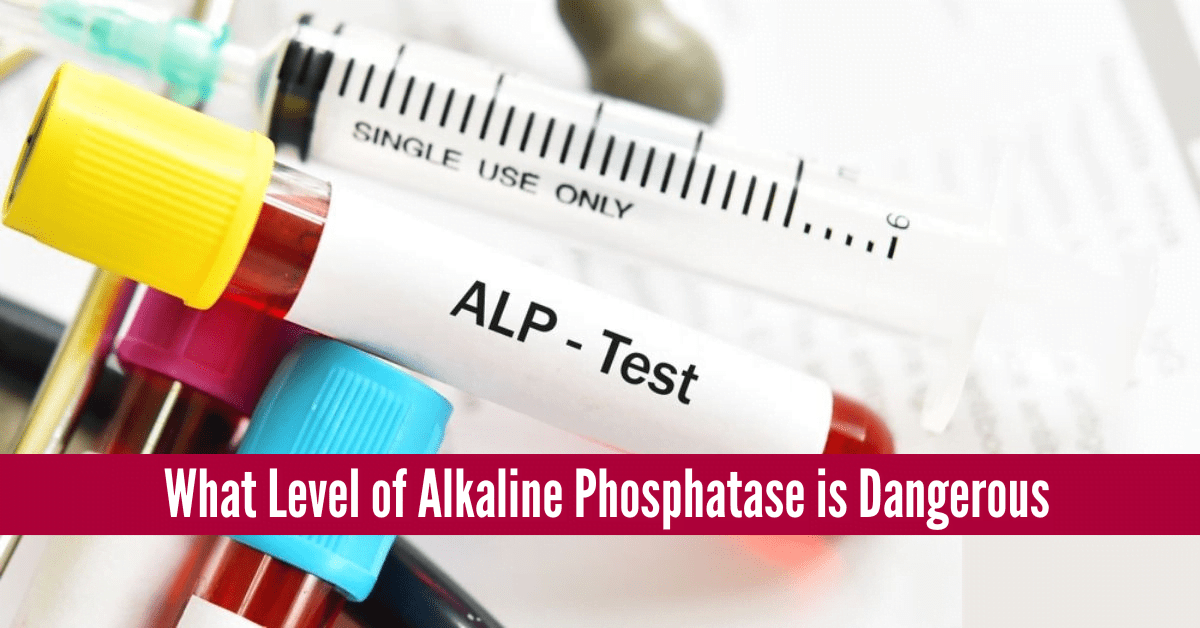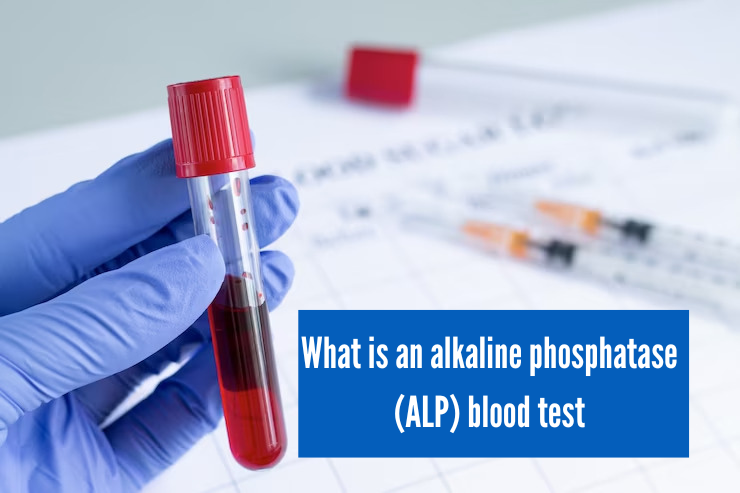What Level of Alkaline Phosphatase is Dangerous

Alkaline phosphatase (ALP) is an enzyme found in various tissues throughout the body, particularly in the bones and liver. Its primary function is to break down proteins and other substances in our bodies. Assessing ALP levels can help diagnose conditions such as liver or bone diseases. However, when ALP levels are too high, it can be a warning sign of underlying health issues.
This blog post will discuss what alkaline phosphatase level is considered dangerous and the potential causes for elevated ALP levels.
Table of Contents
ToggleWhat is alkaline phosphatase (ALP)?
Alkaline phosphatase (ALP) is an enzyme predominantly found in the liver, bones, kidneys, and bile ducts, playing a crucial role in breaking down proteins and contributing to various bodily functions, including bone formation and the breakdown of fats.
This enzyme is present in all body tissues but is most actively produced in the cells that line the bile ducts of the liver, the bone cells, and the placenta.
Its levels in the bloodstream can provide valuable insights into the health of these organs and reveal potential issues such as liver damage or bone disorders. Understanding ALP levels is essential for diagnosing and monitoring various medical conditions.
Causes of an elevated alkaline phosphatase
- ALP is present in high concentrations in the liver. Conditions like bile duct obstruction, cirrhosis, hepatitis, and liver cancer can lead to elevated ALP levels.
- ALP is also produced by bone cells. Bone illnesses such as Pagets condition, osteomalacia (due to vitamin D deficiency), bone cancers, or rapid bone growth (expected in children and adolescents) can raise ALP levels.
- Due to placental production, ALP levels can increase naturally during pregnancy, particularly in the third trimester.
- In cases of severe kidney disease, ALP levels can increase as a secondary effect of changes in bone metabolism.
- Certain endocrine disorders like hyperparathyroidism, which influences bone metabolism, can also elevate ALP levels.
- Certain infections, especially those affecting the liver or bones, can lead to elevated ALP.
- In adolescents, rapid growth periods can temporarily increase ALP levels due to active bone formation.
What is Considered a High Level of Alkaline Phosphatase?
The normal range for alkaline phosphatase levels may vary slightly depending on the testing laboratory, but generally, a healthy adult’s ALP level should be between 20 and 140 IU/L (international units per litre). Anything above this range is considered high or elevated.
However, it’s essential to note that the normal range can also vary based on age, gender, and other factors such as pregnancy. Therefore, it’s crucial to consult with your healthcare provider for a proper interpretation of your ALP results.
What Can Cause High Levels of Alkaline Phosphatase?
Elevated levels of alkaline phosphatase can indicate various conditions or diseases, including:
- Liver Disease: When the liver is damaged or inflamed, ALP levels can increase as the liver cells release this enzyme into the bloodstream.
- Bone Disorders: Conditions affecting bone growth and healing, such as Paget’s disease or fractures, can cause an increase in ALP levels.
- Gallstones: Blockages in the bile ducts due to gallstones can lead to high ALP levels.
- Cancer: Certain cancers, such as liver, bone, or bile duct cancer, can cause elevated ALP levels.
- Medications: Some medications, including birth control pills and antibiotics, can temporarily increase ALP levels.
It’s essential to note that having high levels of alkaline phosphatase does not necessarily mean you have a severe medical condition. Still, following up with your healthcare provider for further testing and proper diagnosis is crucial.
Symptoms of High Levels of Alkaline Phosphatase
In most cases, elevated ALP levels do not cause any symptoms. Instead, they are usually discovered through routine blood tests or during a medical evaluation for other health concerns. However, in some cases, high ALP levels may be accompanied by specific symptoms depending on the underlying cause, such as:
- Fatigue
- Jaundice (yellowing of the skin and eyes)
- Abdominal pain or discomfort
- Nausea and vomiting
If you experience any of these symptoms, it’s essential to consult with your healthcare provider for proper evaluation and treatment.

What is an alkaline phosphatase (ALP) blood test?
An alkaline phosphatase (ALP) blood test is a standard medical test that measures the levels of ALP in your blood. This enzyme is produced by various tissues in the body, including the liver, bones, and placenta.
The ALP blood test can help diagnose and monitor conditions affecting these tissues, such as liver or bone disease. It is typically ordered as part of a routine blood panel or when there are symptoms or risk factors for specific health conditions.
How is an alkaline phosphatase (ALP) blood test performed?
An ALP blood test is a simple procedure that involves drawing a small amount of blood from a vein, usually in the arm. The sample is then sent to a laboratory for analysis.
It is essential to follow your doctor’s pre-test instructions, such as fasting for a certain amount of time before the test.
What do alkaline phosphatase (ALP) blood test results mean?
As mentioned previously, no specific level of ALP can be considered dangerous for everyone. The interpretation of ALP levels will depend on age, gender, and underlying medical conditions.
Your doctor will also consider the context in which the blood test was taken.
What Should You Do if Your ALP Levels Are High?
If your ALP levels are high, the first step is to consult with your healthcare provider. They will likely order additional tests, such as liver function tests, to determine the underlying cause of elevated ALP levels. Depending on the results, further evaluation or treatment may be necessary.
In addition to medical intervention, there are also things you can do at home to help manage high ALP levels, including:
- Maintaining a healthy lifestyle: Eating a balanced diet and exercising regularly can help improve liver and bone health.
- Avoiding alcohol and tobacco use: These substances can further damage the liver and worsen elevated ALP levels.
- Monitoring medications: If you’re taking any medications that may increase ALP levels, it’s crucial to consult with your healthcare provider to see if any adjustments need to be made.
Conclusion
Elevated alkaline phosphatase levels can be a warning sign of underlying health issues, but it’s not always cause for alarm. Working closely with your healthcare provider to determine the cause and appropriate treatment plan is crucial.
Healthy lifestyle habits can also help manage high ALP levels and promote overall well-being. Remember, always consult with your healthcare provider for any concerns regarding your health.
FAQ:
Why do I need to worry about high ALP levels?
High ALP levels can be a sign of liver or bone disease, which can lead to serious health complications if left untreated. It is important to address and monitor high ALP levels through further testing and treatment.
What are the symptoms of elevated ALP levels?
Elevated ALP levels may not cause any noticeable symptoms on their own. However, the underlying condition causing high ALP levels may have symptoms such as jaundice (yellowing of the skin and eyes), fatigue, abdominal pain, bone pain or fractures, and unexplained weight loss.
What factors can affect ALP levels?
Certain medications, such as birth control pills and antibiotics, can increase ALP levels. Pregnancy and bone growth during childhood can also cause temporary increases in ALP levels.
Are there any lifestyle changes that can help lower high ALP levels?
Making healthy lifestyle choices, such as maintaining a balanced diet, exercising regularly, and avoiding excessive alcohol consumption, can help keep ALP levels within a normal range. However, it is important to address any underlying medical conditions causing high ALP levels through proper treatment.
Can I test my ALP levels at home?
No, testing for ALP levels requires a blood sample to be taken and analyzed by a healthcare professional.
What should I do if I have high ALP levels?
If your ALP levels are above the normal range, it is important to follow up with your healthcare provider for further testing and treatment. They will be able to determine the underlying cause of high ALP levels and develop a plan to manage it.
Is there such thing as a dangerous level of ALP?
Generally, high levels of ALP do not reach dangerous levels on their own. However, it is important to address and manage the underlying condition causing high ALP levels to prevent potential health complications.
How often should I get my ALP levels checked?
It is recommended to discuss with your healthcare provider about how often you should get your ALP levels checked. Depending on your individual health situation, this can range from every few months to once a year.





